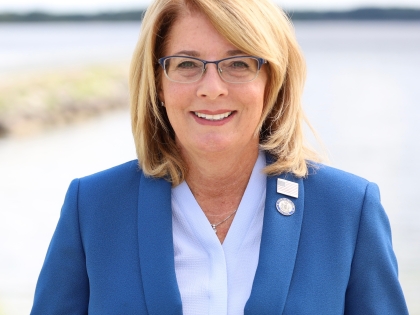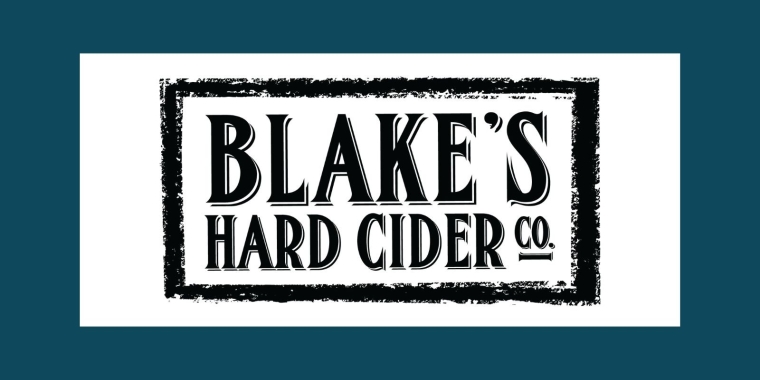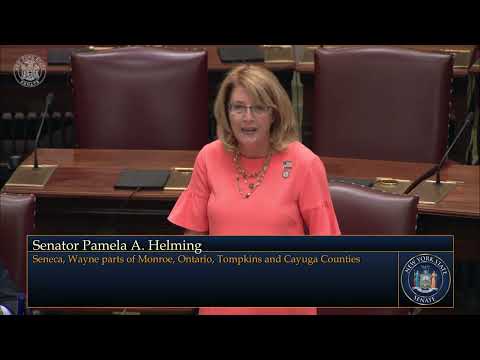
Senator Helming Hosts Farm Brewery Roundtable in Albany
Jonathan Monfiletto - 315-568-9816
February 12, 2018
Senator Helming Hosts Farm Brewery Roundtable in Albany
Albany, NY – Senator Pam Helming, Senate Chair of the Legislative Commission on Rural Resources, held a Farm Brewery Roundtable in Albany on Wednesday, January 31, drawing nearly 60 stakeholders from across New York to the State’s capital. Those in attendance included members of the Legislative Commission on Rural Resources, including Assemblywoman Woerner, Assemblyman Fitzpatrick, and Assemblyman Palmesano, as well as Senator Amedore. Also in attendance were senior staff from the NYS Department of Agriculture and Markets and the State Liquor Authority, representatives of Cornell University, including Mike Stanyard from Cornell Cooperative Extension Wayne County, the New York Farm Bureau, the New York State Brewers Association, as well as Jeff Trout of Poormon Farms in Waterloo, and other various brewers, maltsters, hops growers, and malting barley growers from across the state.
The farm brewery license, established in 2013, incentivizes brewers to use New York grown products in their beer, which is then designated as New York State labeled beer. By the end of 2018, at least 20% of hops and 20% of remaining ingredients used in license holders’ beer must be grown in New York. Those percentage thresholds increase to 60% of ingredients in 2019, and 90% in 2024. In return, licensed farm breweries may serve beer on-site by the glass, and produce and serve cider on-site by the glass. Later, legislation signed by the Governor in 2016 allowed farm breweries to also sell New York State labeled wine and spirits in addition to cider and beer by the glass at their tasting rooms. Licensed farm breweries also enjoy other benefits such as serving and selling samples at farmers’ markets.
“I support the continued success of the New York Farm Brewery License program. Because the license is still relatively new, and higher threshold requirements for the license are on the horizon, it was so important to have everyone in the same room to discuss what the industry needs to remain on-target. Our goal is not only to meet the required percentages of New York-grown hops and barley under the license, but also to continue to produce exemplary, sought-after, New York-labeled beers. I was excited to see so many growers, maltsters, brewers, agency representatives and members invested in this topic, and I am confident that the industry will continue to grow. Farm brewery license holders supply delicious craft beer to consumers. They also help support local, and often rural, commerce, through purchasing local crops for their final product, and using local labor in the brewing process. There are over twenty farm breweries in my district, and over 190 farm breweries throughout New York State. I will continue to support the industry and our rural communities in the current legislative session,” said Senator Helming.
The roundtable began with an insightful presentation by Cheryl Thayer from Cornell Cooperative Extension and Harvest NY, who highlighted the current status of the supply chain—specifically, hops and barley—that are needed to fulfill the NY-grown ingredient requirements of NY-labeled beer. The presentation also explored opportunities to expand the industry in New York, and outlined challenges faced by growers, maltsters, and brewers. After introductory remarks from Kevin King, Director of Agricultural Development at the NYS Department of Agriculture and Markets, and Thomas Donohue, Secretary of the NYS Liquor Authority, the primary focus of the discussion centered around the quality, variety, and future sustainability of hops and barley in New York.
Participants were largely in agreement that the industry will be able to meet the scheduled increases in the percentage of NY-grown ingredients in NY-labeled beer, which will occur in 2019 and in 2024. There is concern, however, that growers are incurring a disproportionate risk in this new and growing industry, and that oversupply of hops and barley is occurring in some instances. In addition, while there are, in volume, enough high-quality hops and barley grown in NY to meet projected demand under the license, there is a desire within the industry to develop NY-specific varietals of hops and barley that will make the farm brewery industry more unique and valuable—just as exists in New York’s wine industry with unique varietals such as the Cayuga White and Traminette wine grapes, and in New York’s apple industry with the RubyFrost apple.
In closing, participants agreed on the need for significantly greater investment in the industry, in both research and market assistance.
Senator Helming valued the opportunity to bring industry stakeholders together and for a productive roundtable discussion that shed light on opportunities and challenges facing the industry. This information will inform Legislators of ways they can best support farmers and brewers through the budget process and legislative action.
State Agriculture Commissioner Richard A. Ball said, “Producing world-class craft beer starts with high-quality crops. We are fortunate to have both innovative brewers and incredible growers in New York State and the farm brewery license is a great way to bring them together. Since the Farm Brewery law was enacted, we have seen tremendous synergy between our craft beverage industry and our agriculture community that is driving tourism and regional economic growth. With targeted funding for research on hops and barley varietals, the leadership of our Governor, and the support of our Legislature and industry stakeholders, I am confident we will continue to help New York’s producers grow their businesses.”
State Liquor Authority Chairman Vincent Bradley said, “New York’s craft brewing industry has exploded since the Governor’s Farm Brewery law went into effect, and it shows no signs of slowing. This new license has not only led to the creation of nearly 200 farm breweries, but has also stimulated the state’s agricultural production of hops and barley in addition to boosting tourism throughout New York. Discussions like the Farm Brewery Roundtable allow this administration to continue to create the best environment for our craft brewing industry to flourish by hearing directly from brewers, growers, maltsters and researchers about the successes, opportunities and challenges they face.”
Empire State Development President, CEO & Commissioner Howard Zemsky said, “The tremendous growth and success of New York’s craft beverage industry has directly impacted the state’s tourism and farm economies, encouraging visitation and providing growers with a bigger market for their products. Under the leadership of Governor Cuomo, craft beverage manufacturing will continue to thrive in New York State, creating jobs and boosting regional economies.”
New York State Brewers Association Executive Director Paul Leone said, “With the brewing industry growing at a record pace in New York State, this meeting was an important step in understanding what the hop growers, maltsters, farmers, and breweries will need as we continue that growth. We are at a critical point in our success of the farm license, and the more we can educate ourselves, state legislators, and the agricultural stakeholders, the stronger we’ll be moving forward. We thank Senator Helming for organizing this roundtable, and hope to continue having them in the coming years.”
“Farm breweries, along with all farm-based beverages, help New York agriculture and the rural economies in which they exist grow and thrive,” said Jeff Williams, Public Policy Director for New York Farm Bureau. “Senator Helming recognizes this and works to solve the challenges of this developing industry. We are truly appreciative of her support.”
“The leadership shown by the Rural Resources Commission in identifying barriers to the successful use of New York-grown barley and hops is providing a spark that will enable Cornell faculty and research to plan new programs,” said Julie Suarez, associate dean for the Cornell College of Agriculture and Life Sciences, or CALS. “Our college has partnered with New York’s farm and food community for more than 150 years to deliver vital research and innovation so farmers can evolve and grow their businesses and consumers can access affordable and healthy new farm and food products. We thank Senator Helming and the Rural Resources Commission for viewing Cornell CALS as a partner in making the Farm Brewery License program a success.”
Senator Helming represents the 54th Senate District, which consists of Seneca and Wayne Counties, parts of Cayuga and Ontario Counties, and the towns of Lansing and Webster. For more information, please visit Senator Helming’s website, or follow @SenatorHelming on Facebook or Twitter.
###
Share this Article or Press Release
Newsroom
Go to Newsroom

